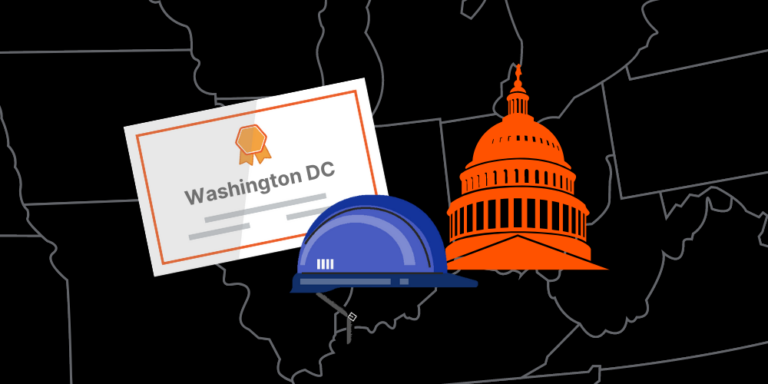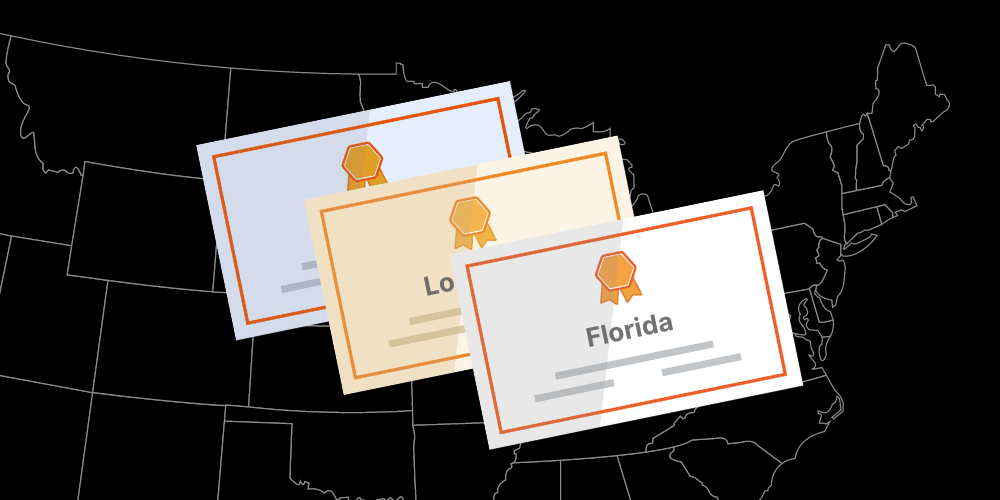— 5 min read
Guide to Washington D.C. Contractor Licenses
Last Updated Jun 11, 2024
Last Updated Jun 11, 2024

Washington D.C. is a unique place when it comes to construction. First, many contracting businesses working within D.C. are actually from the neighboring states, not D.C. itself. Second, the rules and regulations that exist are very different from those states, so it can seem like an intimidating territory for expansion. For example, getting a D.C. contractor license or D.C. home improvement license each has unique requirements.
But if you’re starting a business or trying to expand into D.C., this guide will help you understand the requirements, identify which ones apply to you, and how to go about getting a D.C. contractor license.
Working in other states outside D.C.? Check out the Guide to Contractor Licensing in Every State.
Table of contents
Who needs a contractor license in D.C.?
If you’re wondering if you need a contractor license to work in DC, the answer is: Almost certainly. Washington D.C. requires all contractors that work in the district to carry a license. This includes general contractors, home improvement contractors, and specialty contractors.
D.C. contractor license requirements state that “any person who, for a fee, is contracted to do construction on real property owned, controlled, or leased by another person of commercial, industrial, institutional, governmental, residential, or accessory use building or structures” needs a license.
Also, general contracting includes heavy construction, land development, and the construction of new buildings. Contractors falling under this category require a Basic Business License for General Contractor/Construction Manager License.
And, unlike most U.S. states, this designation includes repair, remodeling, improvements, or demolition of buildings or structures.
There is also a license specifically for those working solely on residential properties, known as Home Improvement Contractors. It requires a different license known as a Basic Business License for Home Improvement Salesperson.
To be clear, both of these license types include contractors and trades like:
- Roofing
- Rough carpentry
- Flooring
- Sheetrock
- Finish carpentry
- Electrical (requires an additional license)
- Plumbing (requires an additional license)
- HVAC (requires an additional license)
- And basically every other trade involved in the construction industry
How to get a D.C. contractor license
Let’s take a look at these licenses on a case-by-case basis to determine which one (or ones) you might need and how to get one issued to your business.
As of 2022, contractor licensing in Washington, D.C. is managed by the Department of Licensing and Consumer Protection.
Note: Not only do contractors in D.C. need contractor licenses, but they also need to register their businesses with the Office of Tax and Revenue.
Stay updated on what’s happening in construction.
Subscribe to Blueprint, Procore’s free construction newsletter, to get content from industry experts delivered straight to your inbox.

General contractors/construction manager licenses in D.C.
The requirements for the license for general contractors/construction managers are:
- Fill out the application using AccessDC
- Provide three copies of two or more sample contracts and receipts
- Provide tax registration information
- Provide a certificate of liability insurance
- Pay a $654.50 fee
Home improvement license for D.C. contractors
The requirements for the Home Improvement License are:
- Apply using the application on AccessDC
- Pay a $288.20 fee
- Provide the following documents:
D.C. specialty contractor licenses
Specialty contractor licenses are managed by the Board of Industrial Trades as part of the Department of Licensing and Consumer Protection. Trades that must apply for licensing include:
In some cases, electrical contractors working in Maryland and Virginia are able to have reciprocity with their licenses. In most other cases, contractors will need to follow the application process specific to Washington, D.C.
Follow these steps:
- Include a 2" x 2" passport photo, a government ID, and payment information for the fee.
- Take an examination to prove competency. Note: Electricians, Steam and Operating Engineers, Plumbers and Gasfitters, and HVAC contractors can test first, then apply afterward. All other trades must apply first before taking the examination.
Penalties for unlicensed contractors in D.C.
There are a lot of hoops to jump through in order to obtain a D.C. contractor license, and it might seem like an unnecessary step — but the District of Columbia takes its contractor licensing requirements very seriously.
A Class 1 infraction carries a minimum penalty of $2,000 for the first offense. If a licensed contractor hires an unlicensed subcontractor, both the licensed contractor and sub are guilty of this Class 1 Infraction, and both will receive the fines.
Also, don’t minimize the importance of lien rights. Remember, unlicensed contractors working in D.C have no right to a mechanics lien.
This means that even if they deliver a project perfectly to contract, the project owner could choose not to pay them without worrying about the recourse of a lien.
Additionally, Lien claimants with business structures organized under D.C laws or working in D.C must provide a copy of their current license to file a lien. Also, they must provide a certificate of good standing from the Department of Consumer and Regulatory Affairs issued within 180 days prior to the filing date. Those are the laws under the statutes regulating lien rights, but the Recorder's Office has been known to impose additional licensing “rules” that might not be so clearly written in the statutes. So, if you want to file a mechanics lien in D.C, licensing is absolutely required — otherwise, you may be left with little to no recourse to recover payment.
Was this article helpful?
Thank you for your submission.
86%
14%
You voted that this article was . Was this a mistake? If so, change your vote here.
Scroll less, learn more about construction.
Subscribe to The Blueprint, Procore’s construction newsletter, to get content from industry experts delivered straight to your inbox.
By clicking this button, you agree to our Privacy Notice and Terms of Service.
Categories:
Tags:
Written by
Tom Scalisi
57 articles
Tom Scalisi is a writer with over 15 years of experience in the trades. He is passionate about educating contractors and specialty contractors about the best practices in the industry. He has seen first-hand how education, communication, and preparation help construction professionals overcome challenges to build a strong career and thriving business in the industry.
View profileExplore more helpful resources

Contractor License Bonds: Everything You Need to Know
In order to perform construction work, many states require contractors to be “licensed and bonded.” What does that mean? Well, every state sets its own rules for contractor licensing, and...

Contractor’s Guide to License Reciprocity: Working Across State Lines
For many contractors, growing a construction business means taking on jobs in different states. Whether it’s to take a one-off project or to establish a new business location, working in...

Vermont Contractor License: Guide to Rules & Requirements
If you’re starting a construction business in Vermont or looking to expand your business from another state, being properly licensed to work is one of the first key steps. There...

The Maine Contractor License: Guide to Rules & Requirements
If you’re considering starting a contracting business in Maine, it’s important to know the rules and requirements for proper licensing. Maine takes a different approach to contractor licensing than most...